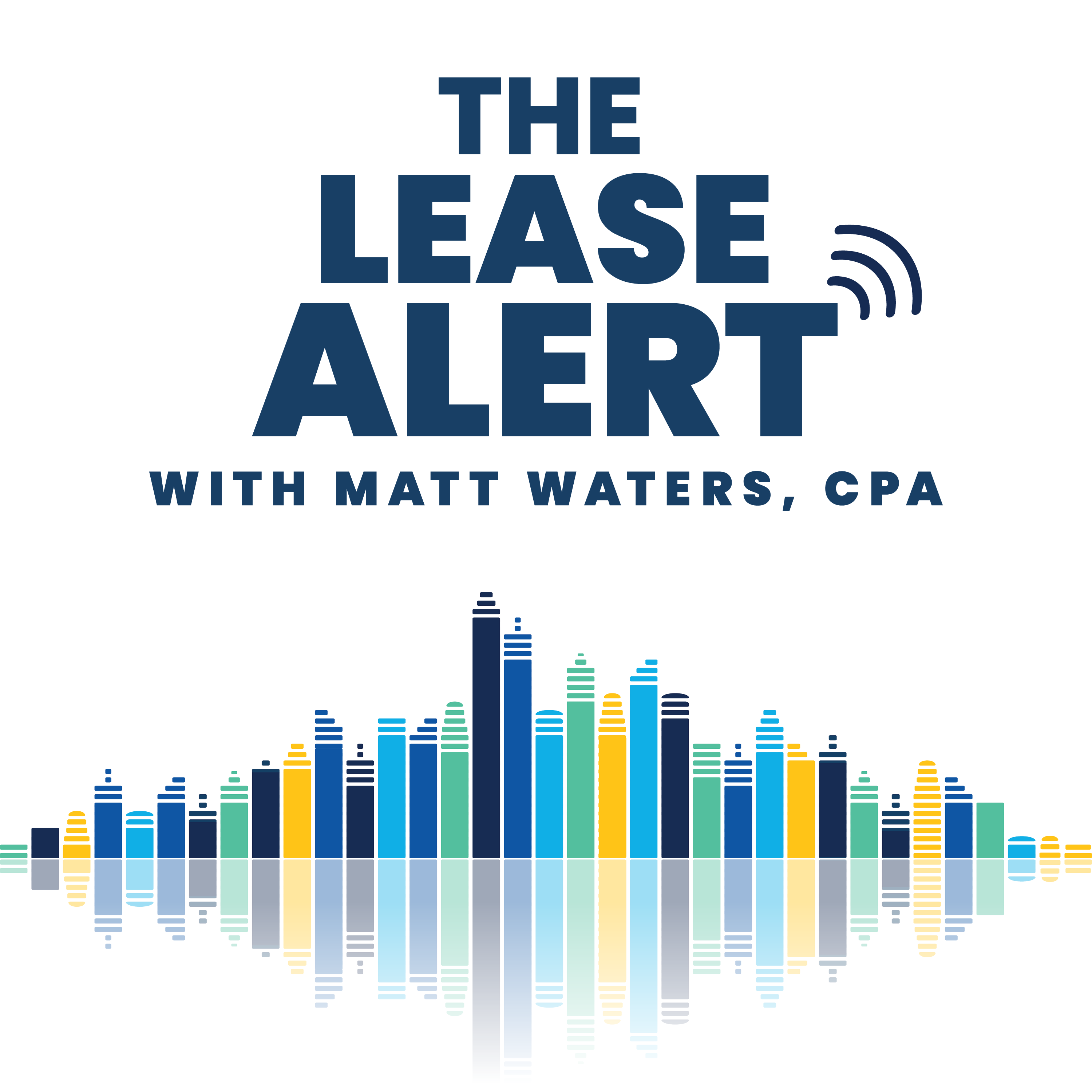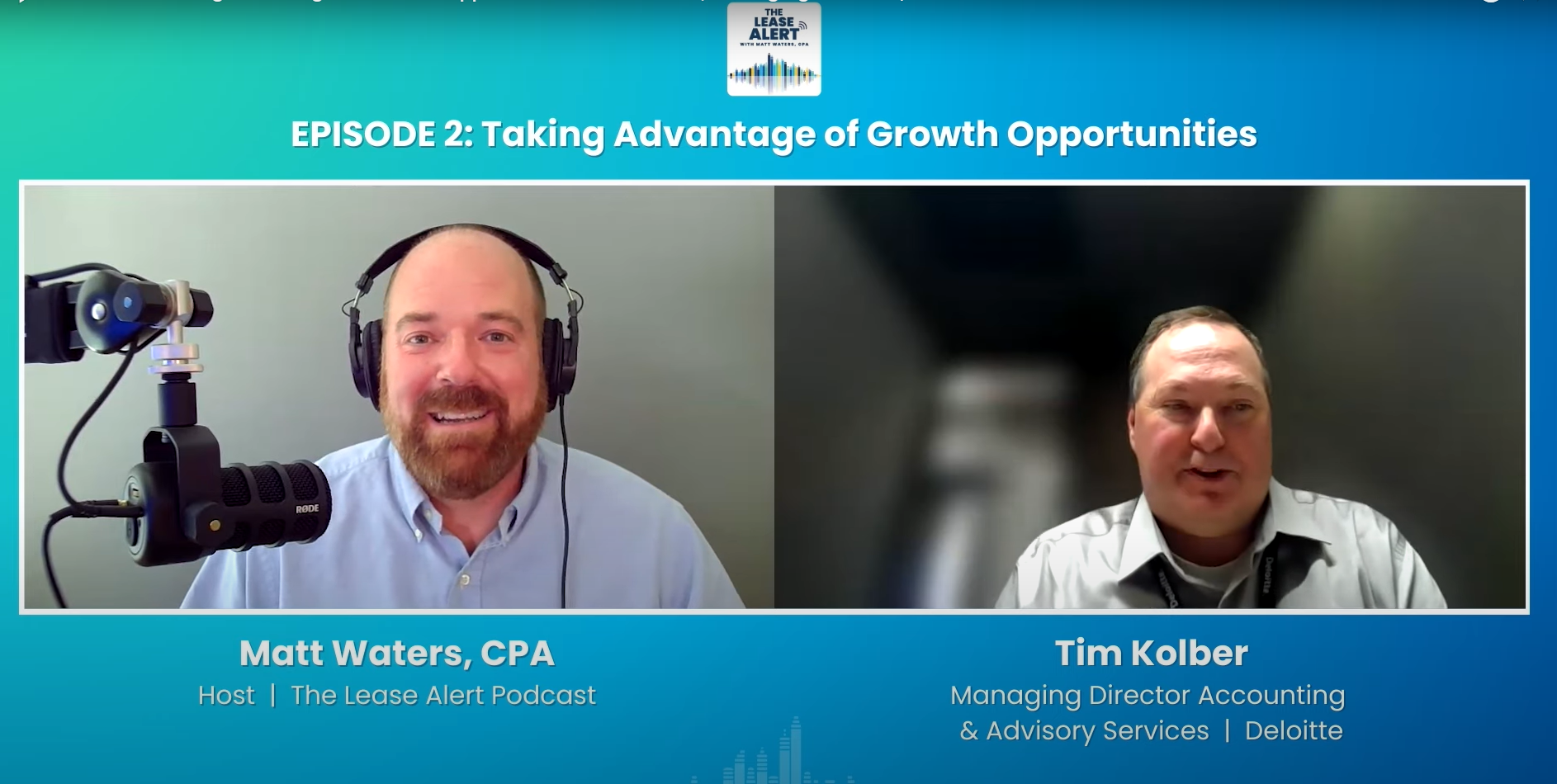Share this
by Matt Waters, CPA on June 19, 2025
Matt Waters: Hello and welcome to The Lease Alert, where we have conversations with the smartest, most interesting people at the intersection of real estate, leasing, and accounting. I'm your host, Matt Waters. Let's learn something together.
On this bonus episode, Tim Kolber describes some of the more complex areas of lease accounting and what's next for lease accounting practitioners.
Matt Waters: I was talking to a group of young professionals, I'd say, entering more on the lease administration space yesterday, and we were talking about terminations and subleases, but what I said was, tonight we're going to talk about this in two sections, terminations and subleases, but in reality, these always come in this big jumbled up transaction that you have to sort out, because if you're thinking about terminating a lease, you should really also be thinking about subleasing and comparing the amount that you have to pay as a termination penalty with the potential loss that you might take by discounting the lease and subleasing it.
Even on top of that, there are impairment considerations that could come into play. When you're in this situation you have to start thinking about these less in terms of each individual section - it's not like a chapter in a book. Well, today, we're going to think about terminations and tomorrow we're going to think about some leasing and then maybe the next day we'll think about abandonments or impairments. It really all comes together, and you have to evaluate where you are as an organization where this particular lease is and then choose the best path for your organization. Keeping in mind the financial statement impact. It really is lots of concepts intersecting a very very robust area of accounting.
Tim Kolber: As you can very well imagine, most organizations, I would even go as far as saying substantially all organizations are always at the C suite level. Looking at the best way to manage and operate the organization. We can just think about it from the real estate perspective. You have this real estate rationalization mentality that many organizations are embarking on.
It's do we need to expand our real estate footprint? Do we need to shrink our real estate footprint? Do we need to change the jurisdiction on where we are actually doing business? At the C suite level, these are a lot of times more operational and business strategy decisions. The knock-on impact is these decisions will have a significant impact on the underlying accounting that makes its way into the books and records of the company and ultimately the financial statements.
All of the points that you touched on, Matt, are probably the key questions that are raised by organizations in their technical accounting policy teams or in their controllership function. Is if we were to do X, how would this impact the accounting of the underlying leased assets and assets as a whole?
The starting point is, it's not just a, if we do X, will only the answer only be Y. Oftentimes, there's a lot of interrelations between what the decision is and the ultimate accounting. Case in point, if an organization decides that they're going to early exit one specific floor in a corporate headquarters, the first thing that comes to my mind is, is there a lease modification that may come into play? Is there a potential for implications of an early termination of the lease? How are we going to deal with the underlying leased asset from the impairment perspective? Is there an abandonment? There's a list.
Let me have questions that need to be addressed as organizations are changing their real estate footprint and changing their approach to accounting for their leased real estate and then another knock-on impact is if you're making decisions about your leased assets. There could be other impacts to the underlying assets related to that lease. Case in point, let's assume that there are leasehold improvements or other assets that are linked to the leased asset. There may be an accounting consequence for early exiting a space that oftentimes organizations are missing. The good news is all of these questions are keeping myself as well as others in the profession, as well as yourself, Matt, in business, because we continuously have questions that we have to help our clients with and help other stakeholders understand the business rationale consequences of certain decisions.

More from Tim & Matt!
Taking Advantage of Growth Opportunities in Lease Accounting
Matt Waters: From your perspective, you’re kind of the final line of defense so speak, for the questions that get asked to Deloitte. It makes its way through the manager level, senior manager, director, partner, ultimately, if it's a complicated lease accounting question that they need backup on, it comes to Tim Kolber’s desk.
Can you tell us any more questions where you think companies are facing particular challenges and those questions make their way to you?
Tim Kolber: Well, I would say, and this is just a small correction, ultimately, it's management's responsibility to conclude on their account. There's a plethora of guidance and interpretive views out there.
There's our roadmap. There are other interpretive manuals. When it comes to myself and others on my team, the questions generally get to us when there's either significant complexity, where there are diverse points of view, or when there is a need to understand how to interpret their requirements. Ultimately, whatever thoughts and perspectives we provide to our clients or our teams, it's management that has to conclude on their approach and what they believe is the correct answer, we can point them in the right direction.
We can lead them to the water, so to speak, but it's up to them to conclude some of the more common areas of questions that we are getting from our clients are transactional based.
Think about a business acquiring another business and there are certain accounting consequences that need to be applied. In that case, if a business is acquired and there are various leased assets in the acquired business, then oftentimes some of the questions we get relate to “how do you apply the ASC topic 805 guidance on business combinations to leased assets when they are acquired.” That is one group of questions we often get.
We've also seen a number of sale and leaseback transactions that have been occurring in the current marketplace.
Think of a scenario where an entity owns a property. They may not need the entire property for its business purposes, or they may need the entire property, but may just want to monetize the asset. They sell the asset, and then they lease it back for a period of time, whether it be the entire asset or part of the asset. There is a lot of complexity about what the accounting implications are for those types of transactions. Myself and my team often get involved in a number of those questions because of the complexity of dealing with sale and leaseback accounting.
Hear from experts directly in a CoStar webinar
See what's next
There are all sorts of unique transactions that are being executed in the marketplace by various suppliers that may have some lease accounting implications. When it comes to mine, it’s either energy as a service, infrastructure as a service, and each of those types of transactions may have some accounting complexities and may have some lease accounting related considerations that it's not black and white in the accounting literature on how you would account for those types of transactions.
In those scenarios, they reach out to their accounting advisors. They may even have informal discussions with their audit teams to see if they have any basic literature on the accounting implications of these types of transactions. But in those cases, that is where somebody like me or somebody from my team may get involved in the discussions.
I guess the moral of the story, and just as a high level, is what are we seeing and how are we getting involved in the discussions, anytime where there is a unique transaction that has a level of complexity that's not directly addressed in the accounting literature that is generally when we'll have an advisory client come to us with questions or an engagement team come to us with questions on what the company should be thinking about and it's at that time where the years of experience understanding all of the standard setting that has happened up to this date and then understanding all of the discussions that may have happened at the accounting firm level.
That is where all of those interpretive views and quote unquote tools in the toolbox are pulled together. To come up with a reasonable and supportable approach. That we could highlight to our clients. But again, ultimately, we can lead our clients to the water. They ultimately have to take what we say and come up with what they believe is their supportable view.
Ultimately, if it's a Deloitte client, the Deloitte audit team has to get comfortable with the conclusion. If it's a non-Deloitte client, I will recommend that you always have those discussions with your auditors, so they are along the way and understand the complexities of the transactions that are in question.
Does that address your question, Matt?
Matt Waters: Yeah, absolutely. I appreciate the insight there and thank you for listening to The Lease Alert. I'd be grateful if you would like and subscribe wherever you listen. Until next time, keep learning and leasing.
Share this
- Lease Accounting Software (90)
- ASC 842 (83)
- Accounting Teams (53)
- Lease Administration Software (27)
- Retail Tenants (16)
- Commercial Real Estate (14)
- Lease Management (13)
- Real Estate Teams (10)
- ESG (8)
- Market Data and Analytics (8)
- Success Stories (8)
- News and Media Coverage (5)
- Transaction Management Software (2)
- frs 102 (2)
- Customer Success (1)
- Healthcare real estate (1)
- Office Tenants (1)
- December 2025 (1)
- September 2025 (1)
- July 2025 (2)
- June 2025 (4)
- May 2025 (2)
- April 2025 (2)
- March 2025 (6)
- February 2025 (3)
- January 2025 (4)
- December 2024 (1)
- October 2024 (4)
- September 2024 (2)
- August 2024 (4)
- July 2024 (3)
- June 2024 (3)
- May 2024 (4)
- April 2024 (1)
- February 2024 (1)
- December 2023 (4)
- November 2023 (6)
- October 2023 (4)
- September 2023 (2)
- August 2023 (2)
- July 2023 (3)
- May 2023 (2)
- March 2023 (1)
- February 2023 (3)
- January 2023 (1)
- December 2022 (3)
- November 2022 (4)
- October 2022 (4)
- September 2022 (1)
- August 2022 (4)
- June 2022 (1)
- May 2022 (4)
- April 2022 (8)
- March 2022 (3)
- February 2022 (1)
- January 2022 (2)
- November 2021 (2)
- October 2021 (2)
- September 2021 (3)
- August 2021 (15)
- July 2021 (3)
- June 2021 (1)
- May 2021 (1)
- April 2021 (3)
- March 2021 (1)
- January 2021 (1)
- December 2020 (3)
- November 2020 (1)
- October 2020 (2)
- September 2020 (2)
- August 2020 (3)
- July 2020 (2)
- June 2020 (3)
- May 2020 (1)
- April 2020 (1)
- March 2020 (1)
- February 2020 (1)
- December 2019 (1)
- October 2019 (1)
- September 2019 (2)
- August 2019 (3)
- July 2019 (2)
- April 2019 (69)
- October 2018 (1)
- August 2018 (1)
- July 2018 (1)
- June 2018 (1)
- May 2018 (1)
- April 2018 (2)
- March 2018 (3)
- February 2018 (2)
- December 2017 (1)
- August 2017 (3)
- June 2017 (2)
- May 2017 (2)
- April 2017 (1)
- March 2017 (2)
- January 2017 (2)
- November 2016 (2)
- July 2016 (1)
- June 2016 (1)
- July 2015 (1)
- March 2015 (1)
- June 2014 (1)
- April 2014 (11)
- October 2011 (1)
You May Also Like
These Related Stories

FRS 102 Practical Expedients and How to Manage Them

IFRS 16 Practical Expedients and How to Manage Them



